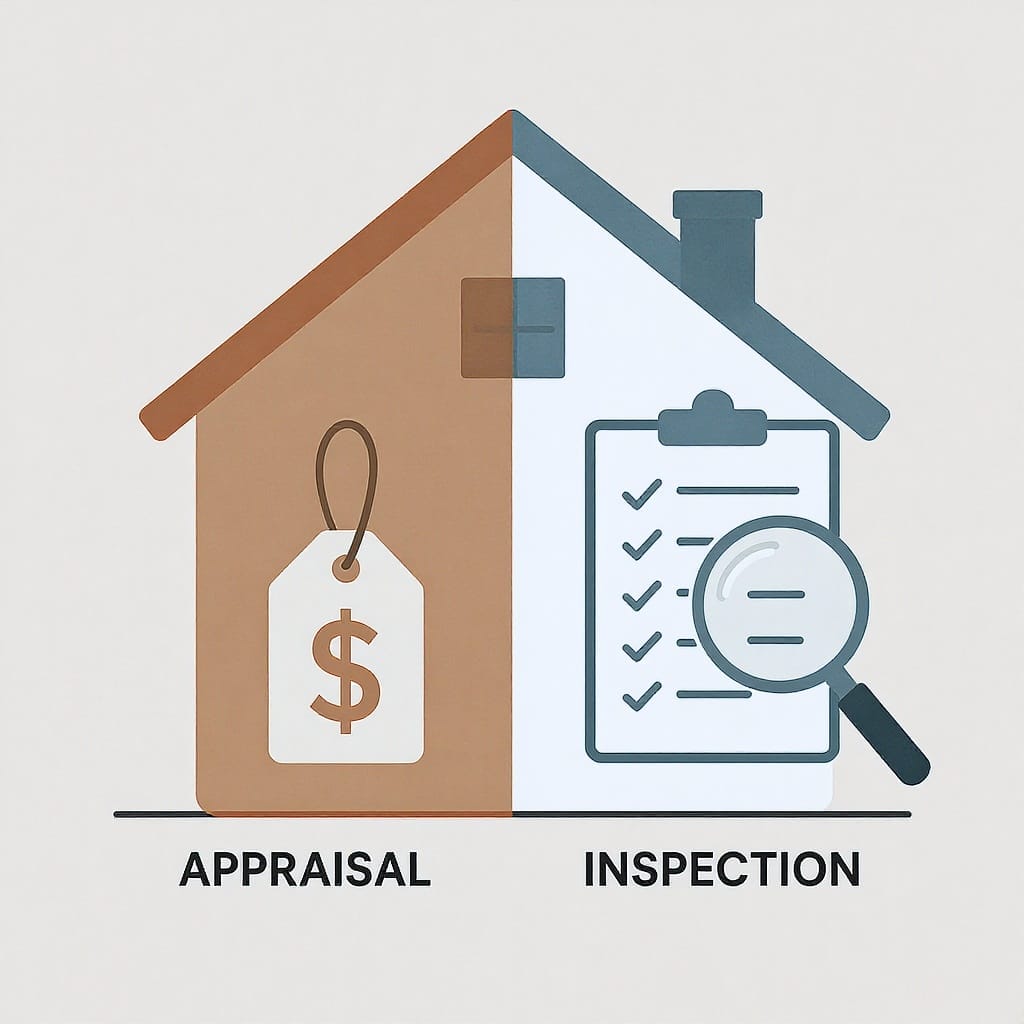When buying a home, you’ll encounter two important processes that sound similar but serve very different purposes. An appraisal determines your home’s market value, while an inspection reveals the property’s physical condition and any needed repairs. Both protect your investment, but they work in completely different ways.

Many first-time buyers confuse these two steps or think they can skip one to save money. This mistake can cost thousands of dollars or leave you stuck with expensive problems. Understanding when each happens, who pays for what, and how they affect your purchase helps you make smarter decisions.
You’ll learn exactly how each process works, what to expect during both visits, and why skipping either one puts your investment at risk. We’ll also cover common mistakes buyers make and share practical tips to help you navigate both requirements smoothly.
Appraisal vs Inspection: What’s the Difference?
An appraisal determines your home’s fair market value for the lender, while an inspection checks the physical condition to protect your investment. Both serve different but equally important roles in your real estate transaction.
Purpose of an Appraisal
An appraisal tells your lender what the home is actually worth. This protects the bank from lending more money than the property’s value.
A licensed appraiser looks at recent sales of similar homes in the area. They also check the home’s condition, size, and location. The appraisal determines the property’s estimated market value based on these factors.
Your lender orders and requires the appraisal. You cannot get a mortgage without one. The appraisal makes sure you are not overpaying for the home.
If the appraisal comes back lower than your offer price, you have options. You can pay the difference in cash, ask the seller to lower the price, or walk away from the deal.
The appraiser creates a detailed report with photos and comparable sales data. This report becomes part of your mortgage file.
Purpose of a Home Inspection
A home inspection protects you by finding problems with the house before you buy it. The inspector checks all the major systems and parts of the home.
Home inspections identify potential major issues like electrical problems, plumbing leaks, or roof damage. This helps you avoid costly surprises after closing.
You hire and pay for the inspection yourself. Most buyers include an inspection contingency in their offer. This lets you back out or ask for repairs if major problems are found.
The inspector examines these key areas:
- Electrical systems and outlets
- Plumbing and water pressure
- Heating and cooling systems
- Roof and gutters
- Foundation and structure
- Windows and doors
You should attend the inspection to ask questions. The inspector will explain any problems they find and suggest repairs.
Key Differences at a Glance
| Factor | Appraisal | Home Inspection |
|---|---|---|
| Purpose | Determines fair market value | Checks physical condition |
| Who orders it | Your lender | You (the buyer) |
| Cost | $300-$600 | $400-$800 |
| Required | Yes, for mortgage | Optional but recommended |
| Focus | Property value | Safety and repairs |
The timing matters too. Both occur during escrow after your offer is accepted. Inspections happen first, usually within a week.
Appraisals affect your loan approval directly. If the home appraises for less than your offer, your lender will only finance the appraised amount.
Inspections give you negotiating power. You can ask the seller to fix problems or reduce the price based on repair costs.
Key point: You need both for a safe real estate transaction. The appraisal protects your lender, while the inspection protects you.
How the Appraisal Process Works
The appraisal process involves three main steps that determine what your home is worth. A licensed professional visits your property, compares it to recent sales, and creates a detailed report for your mortgage lender.
Licensed Appraiser and Their Role
Your mortgage lender selects a licensed appraiser to evaluate the property you want to buy. The appraiser acts as an independent third party who has no interest in whether your deal goes through.
Licensed appraisers must complete extensive training and pass state certification exams. They follow strict guidelines to ensure accurate property valuation.
The appraiser visits the home for about an hour to examine its condition and features. They take photos and notes about the property’s size, layout, and overall condition.
Key responsibilities include:
- Measuring rooms and living spaces
- Checking the home’s general condition
- Noting special features or upgrades
- Documenting any obvious problems
You typically pay around $400 to $750 for the appraisal as part of your closing costs. The final amount depends on your home’s size and location.
Determining Fair Market Value
Fair market value represents what a willing buyer would pay a willing seller in today’s market. The appraiser uses this concept to decide if your offer price makes sense.
The appraiser considers several factors when determining value:
| Factor | What They Look At |
|---|---|
| Location | Neighborhood quality and amenities |
| Size | Square footage and lot size |
| Condition | Overall maintenance and repairs needed |
| Features | Updates, finishes, and special amenities |
| Market trends | Recent price changes in the area |
The appraiser completes most of their work back at the office. They analyze all the data they collected and research recent sales in your neighborhood.
The goal is to provide an unbiased estimate that protects both you and your lender from overpaying.
Using Comparable Sales (Comps)
Comparable sales or “comps” form the backbone of every appraisal. These are similar homes that sold recently in your area.
The appraiser looks for homes that match your property as closely as possible. They prefer sales from the past three to six months within a one-mile radius.
Ideal comparable sales share these features:
- Similar square footage (within 10-20%)
- Same number of bedrooms and bathrooms
- Comparable lot size and location
- Similar age and condition
When perfect matches don’t exist, the appraiser makes adjustments. They add or subtract value based on differences between your home and the comps.
For example, if your home has an updated kitchen but the comp doesn’t, the appraiser adds value. If the comp has a finished basement but yours doesn’t, they subtract value.
The appraiser typically uses three to five comparable sales to support their final value. This helps ensure the appraisal reflects current market conditions accurately.
How the Home Inspection Process Works

A professional home inspector examines your property’s condition through a systematic review of all major systems and structural components. The inspector documents any problems found and creates a detailed report you can use to make informed decisions about your purchase.
Scope of a Home Inspection
A home inspection covers all accessible areas of the property you want to buy. The inspector checks both inside and outside areas during their visit.
What Gets Inspected:
- Foundation and structural elements
- Roof and attic spaces
- Windows and doors
- Plumbing systems
- Electrical system components
- Heating and cooling equipment
- Insulation and ventilation
The inspection takes 2-4 hours depending on the home’s size. You can walk through with the inspector to ask questions and learn about your potential new home.
What’s Not Included:
- Hidden problems behind walls
- Future performance predictions
- Specialized tests for mold or radon
- Pool equipment or sprinkler systems
- Cosmetic issues like paint or flooring
Assessing Major Systems and Structure
The inspector uses specialized tools and knowledge to check each system thoroughly. They look for safety issues and problems that could cost you money later.
Structural Assessment:
- Foundation cracks or settling
- Wall and ceiling damage
- Floor stability and levelness
System Evaluations:
- Electrical system wiring and panels
- Water pressure and pipe condition
- Heating and air conditioning function
- Roof condition and potential leaks
The inspector tests outlets, runs water, and checks that safety features work properly. They look for code violations and wear that needs attention.
They document problems with photos and notes. Major issues get flagged as safety concerns or expensive repairs.
Reporting Inspection Findings
You receive a detailed written report within 24-48 hours after the inspection is completed. This report becomes your roadmap for understanding the property’s condition.
Report Contents:
- Major defects requiring immediate attention
- Minor issues for future maintenance
- Safety concerns that need quick fixes
- Photos showing problem areas
- Repair recommendations
The report separates urgent repairs from routine maintenance items. This helps you decide what to negotiate with the seller.
You can use inspection findings to:
- Request seller repairs before closing
- Ask for money off the purchase price
- Plan your future maintenance budget
- Walk away if problems are too serious
The inspection report protects you from buying a home with hidden expensive problems.
Why Both Appraisal and Inspection Matter in Real Estate

Both processes protect your financial investment and ensure you make smart decisions during your home purchase. Appraisals verify the property’s market value while inspections reveal its physical condition, giving you complete information before closing.
Protecting Buyers and Sellers
Appraisals protect you from overpaying for a home by confirming its true market value. Mortgage lenders require appraisals to ensure the loan amount matches the property’s worth.
If the appraisal comes in low, you have several options:
- Negotiate a lower purchase price
- Pay the difference in cash
- Walk away from the deal
Inspections protect you from costly surprises after moving in. A professional inspector checks major systems like plumbing, electrical, and HVAC.
Common inspection findings include:
- Roof damage or leaks
- Foundation cracks
- Outdated electrical wiring
- Plumbing issues
Sellers also benefit when buyers get inspections. It reduces the chance of deals falling through due to unexpected problems discovered later.
Impact on Negotiations and Financing
Your mortgage lender uses the appraisal to determine how much they will loan you. Most lenders won’t approve loans above the appraised value.
Inspection results give you strong negotiating power. You can ask sellers to:
- Fix major problems before closing
- Reduce the sale price
- Provide credits for repairs
The timing of both processes affects your real estate transaction. Inspections typically happen within the first week after your offer acceptance. Appraisals usually occur 1-2 weeks later.
Failed appraisals can delay or kill deals. About 4% of home sales fall through due to low appraisals. Inspection issues cause another 3% of deals to fail.
Both reports help you make informed decisions about proceeding with confidence or walking away from problematic properties.
When Appraisals and Inspections Are Required
Most mortgage lenders require appraisals to protect their investment, while home inspections remain optional but highly recommended for buyers. The timing and requirements for each process differ based on your financing situation and personal preferences.
Lender Requirements for Appraisals
Mortgage lenders almost always require appraisals when you finance a home purchase. This protects the lender by ensuring the home’s value matches the loan amount you’re requesting.
Your mortgage lender orders the appraisal after your loan application is approved. The appraiser must be licensed and independent from your lender to provide an unbiased valuation.
Cash buyers don’t face appraisal requirements from lenders. However, you might still choose to get an appraisal to confirm you’re paying a fair price.
Some loan types have specific appraisal rules:
- FHA loans require FHA-approved appraisers
- VA loans need VA-certified appraisers
- USDA loans require rural property specialists
- Jumbo loans often need more detailed appraisals
The appraisal protects lenders by ensuring the home’s value matches the loan amount. If you default on your mortgage, the lender can sell the home to recover their money.
You typically pay for the appraisal even though your lender requires it. Costs range from $314 to $423 for single-family homes.
Buyer’s Choice for Home Inspections
Home inspections are usually optional, but most real estate experts strongly recommend them. Unlike appraisals, inspections protect buyers by uncovering potential issues and costly repairs before closing.
You have full control over whether to get an inspection. You also choose the inspector and can attend the inspection process.
Smart buyers almost always get inspections because they reveal problems that could cost thousands later. Hidden issues like electrical problems, plumbing leaks, or structural damage often don’t show up during casual home tours.
Some situations where inspections become more important:
- Older homes (built before 1980)
- Fixer-upper properties
- Homes with previous water damage
- Properties with unique features
You can skip the inspection to make your offer more attractive to sellers. However, this removes your safety net for discovering expensive problems.
Inspection costs typically range from $300 to $500 depending on the home’s size and location. This small investment can save you from major repair bills after closing.
Common Misconceptions and Pitfalls
Many homebuyers make costly mistakes by confusing appraisals with inspections or skipping important steps. These errors can lead to financial problems and missed opportunities to negotiate better terms.
Appraisal Does Not Equal Home Inspection
The biggest mistake homebuyers make is thinking an appraisal and inspection serve the same purpose. They are completely different processes with different goals.
An appraisal focuses only on your home’s market value. The appraiser looks at:
- Recent sales of similar homes
- Your home’s size and features
- Current market conditions
An inspection examines your home’s actual condition. The inspector checks:
- Electrical systems and wiring
- Plumbing and water pressure
- Roof condition and structure
- HVAC systems and air quality
| Appraisal | Inspection |
|---|---|
| Determines market value | Finds safety issues |
| Takes 30-60 minutes | Takes 2-4 hours |
| Required by lender | Optional but recommended |
| Cannot negotiate price | Can negotiate repairs |
Your appraisal might show your home is worth $400,000. But an inspection could find $15,000 in electrical problems that the appraisal missed.
Overlooking Inspection in Favor of Appraisal
Some buyers skip the inspection because their lender requires an appraisal. This is a dangerous mistake that can cost thousands later.
Your lender only cares that the home’s value matches your loan amount. They don’t care if the furnace needs replacing or the roof leaks.
Why you need both:
- The appraisal protects your lender’s investment
- The inspection protects your investment
- Both occur during escrow but serve different purposes
In New York and New Jersey, home inspections typically cost $400-$600. Skipping this small expense could mean missing major problems like:
- Foundation cracks ($5,000-$15,000 to repair)
- Outdated electrical panels ($2,000-$4,000 to upgrade)
- Roof damage ($8,000-$20,000 to replace)
The inspection gives you power to negotiate. You can ask the seller to fix problems or reduce the price. Without an inspection, you buy the home “as-is” with no recourse for hidden issues.
Frequently Asked Questions
Home buyers often have questions about when they need appraisals versus inspections, what each process covers, and how these evaluations impact their purchase. Understanding the costs, requirements, and timing helps you make better decisions during your home buying journey.
What are the primary differences between a home appraisal and a home inspection?
A home appraisal determines your property’s market value for lending purposes. An appraiser looks at comparable sales, location, and overall condition to set a dollar amount.
A home inspection examines the property’s physical condition in detail. The inspector checks for safety issues, needed repairs, and system problems.
Purpose differs completely between the two services. Appraisals protect lenders by confirming the home is worth the loan amount. Inspections protect buyers by revealing costly problems before purchase.
The professionals have different training too. Appraisers need state licensing and focus on property values. Inspectors get certified through organizations and specialize in building systems.
Timeline varies for each service. Inspections happen within the first week after your offer gets accepted. Appraisals usually occur later in the mortgage process.
Can you explain how a home inspection affects the home buying process?
Your inspection happens early in the buying process, typically within 7-10 days after the seller accepts your offer. This timing gives you leverage to negotiate repairs or walk away.
The inspection report lists all problems found in the home. You can use this information to ask the seller to fix issues or reduce the selling price.
Major problems like electrical issues, roof damage, or foundation cracks give you strong negotiating power. Small cosmetic issues usually don’t justify big price changes.
If the inspection reveals serious safety hazards, you can cancel your contract. Most purchase agreements include an inspection contingency that protects your deposit.
You attend the inspection to ask questions and learn about your potential home. This helps you plan for future maintenance and repairs after closing.
What specific elements does an appraiser evaluate when assessing a property’s value?
Appraisers start by measuring the home’s square footage and counting bedrooms and bathrooms. They note the age, condition, and quality of construction materials.
Comparable sales in your neighborhood provide the main value benchmark. The appraiser looks for similar homes sold within the past six months.
Location factors heavily into the final value. Good school districts, low crime rates, and convenient shopping boost property values significantly.
The appraiser checks major systems like heating, plumbing, and electrical. However, they don’t test these systems like an inspector would.
Special features such as pools, fireplaces, or updated kitchens can add value. The appraiser determines how much these improvements contribute to market value.
External factors like busy roads, power lines, or commercial properties nearby can lower the appraised value.
Is it necessary to have both an appraisal and an inspection when purchasing a home?
Most mortgage lenders require an appraisal to approve your loan. This protects them from lending more money than the home is worth.
Home inspections are usually optional but highly recommended. The buyer typically pays for both services unless you negotiate otherwise with the seller.
Cash buyers can skip the appraisal since no lender is involved. However, you still want to know the home’s true market value before paying.
Skipping the inspection is risky and can cost thousands later. Hidden problems like water damage or electrical issues are expensive to fix after closing.
Some buyers waive inspections in competitive markets to strengthen their offers. This strategy works better with newer homes or when you have construction knowledge.
Both services together give you complete protection. The appraisal ensures fair pricing while the inspection reveals costly problems.
In what scenarios might a lender require an appraisal?
All mortgage loans require appraisals to protect the lender’s investment. This includes conventional loans, FHA loans, VA loans, and USDA loans.
Refinancing your existing mortgage triggers a new appraisal requirement. Lenders need current market value before approving the new loan terms.
Home equity loans and credit lines also need appraisals. The lender must know your home’s value to determine how much equity you can borrow against.
When you dispute your property tax assessment, an appraisal provides evidence of your home’s actual value. This can help reduce your annual tax bill.
Divorce settlements often require appraisals to fairly divide marital property. Both parties need an objective value for the family home.
Estate planning and inheritance situations may need appraisals for tax purposes. The IRS requires fair market value for estate tax calculations.
What are the qualifications or certifications needed to perform home appraisals and inspections?
Home appraisers must get state licensing or certification. They complete specific college courses, pass state exams, and work under experienced appraisers as trainees.
Most states require 150-300 hours of appraisal education before licensing. Appraisers also need continuing education credits to maintain their licenses.
Home inspectors get certified through professional organizations like InterNACHI or ASHI. Many states also require licensing or registration for inspectors.
Training requirements vary by state but usually include classroom hours and field experience. Some inspectors have backgrounds in construction or engineering.
Both professions require professional liability insurance to protect clients from errors. This coverage is often required for licensing.
Look for appraisers and inspectors with good local reputations and current certifications. Ask for credentials and references before hiring either professional.

